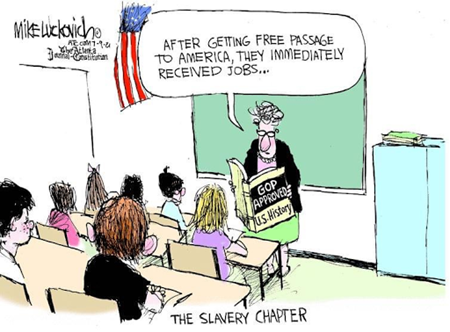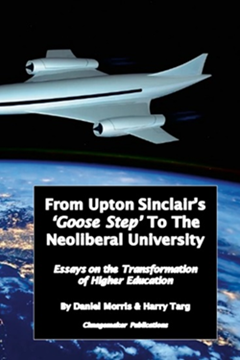
One major element of the maintenance of any political or economic order is the education of the young in such a way as to give legitimacy to it. In the 1960s political scientists began to study what they called “political socialization”: how and what young people learn about the norms, values, and procedures that govern the maintenance of society. Some studies found that children begin to accept the virtues of political institutions, the presidency, the courts, political parties, at very young ages. What they learn about politics in the home is reinforced and developed in school systems. Selective presentations of history and the arts is provided by formal content and repeated rituals, such as the pledge to the flag, competitive sports, routinized social life such as dances. In addition, as theorists such as Jim Berlin argued, the educational system not only produces and reproduces citizenship, but it also reproduces workers, for example giving young people appropriate skills in language and mathematics. Educational theorists have pointed out that the character of education develops and changes as the economy changes, in the US case from small-scale, to industrial, to monopoly capitalism.
In addition to adding “socialization” to the language of analysis, political scientists began to write about “political culture,” or the values and beliefs that dominate the thinking of most members of a society. These include ideas about the basic units of society, individuals or communities for example, the relative importance in the society of cooperation or conflict, the role of “human nature” and whether war and violence are “inevitable.” Perhaps most basic in the United States is the relative acceptance of private property over public goods as a prime value.
In higher education, curricula usually reinforced and solidified the dominant ideas of the political culture. Often social science and humanities disciplines repeated standard paradigms about history, what was great art and philosophy, and what values should be beyond reproach. From the 1940s to the 1960s, the dominant political culture was tinged with virulent anticommunism and political and economic elites, powerful corporations, and state institutions oversaw what was defined as legitimate educational content.
Meanwhile business schools and science and engineering programs trained young people in the skills necessary to enhance the political economy. The humanities and social sciences grounded student learning in the acceptable political culture while the fields, what we call STEM (science, technology, engineering, and mathematics) trained these same students in the tools of system maintenance. The former president of the University of California, Clark Kerr, coined the term “multiversity” to describe the functions of such institutions in the late twentieth century and he made it clear that the multiversity was supposed to serve the national security interests of the United States.
However, during the 1960s young people became increasingly engaged in struggles against racism and on campus challenged the escalation of the war in Vietnam. Many students began to raise questions about what they were studying and the content of the curriculum. While some educational institutions became more repressive, as with the shootings of students at Jackson State and Kent State Universities, increased discourse on college campuses, sometimes initiated by faculty, was critical of the dominant political culture and its normal functioning, that is training workers for the economic machine. The university, to use a workplace metaphor, became “contested terrain.”
Renewed Assaults on Higher Education
Some faculty and students began to criticize the capitalist system, the war machine, the privatization of the commons, and histories that seemed to endorse patriarchy and racism. Discussion, debate, and critical thinking flowered in higher education, But from the vantage point of those who ruled, ideological hegemony had to be reimposed in the educational system. As conservative talk show host Rush Limbaugh once proclaimed in the 1990s, “we,’ that is conservatives, control all major institutions except for the university.
By the new century politicians, university administrators, and economic elites sought to reimpose the traditional political culture by reifying the idea of the market, private over public goods, and in the world at large, the United States and manifest destiny.
History and the Arts were being defunded while college administrators proclaimed that the study of science, technology, engineering, and mathematics (STEM) were the primary tasks of educational systems. Major funds for STEM education and research came from huge corporations, particularly digital, drug, and agricultural corporations, and the military. And in the spirit of Limbaugh, the Koch Foundation, the Association of Trustees and Administrators (ACTA), the State Policy Network, and the Associated Legislative Executive Council (ALEC) worked with state legislatures to reestablish curricula that Kerr in the past approvingly celebrated in the multiversity. In sum. the university was redesigned to instill the ideology of the dominant political culture and to create a twenty-first century work force to serve the needs of monopoly/finance/global capitalism.
More recently, with the rise of the far-rightwing forces around former President Trump, combining corporate elites, religious fundamentalists, extreme free market advocates, and military contractors, the attacks on education have become fierce.
Now politicians close to such powerful groups launch attacks on education in state houses and the halls of Congress. Critical Race Theory, rather than being a short-hand description for a body of legal scholarship, has been redefined as ideology. Politicians running for office talk about the Civil War without mentioning slavery as a root cause. Charges of antisemitism are being used to challenge expressions of intellectual and political points of view on campuses. Presidents at our most prestigious universities, women and persons of color, have been attacked for defending academic freedom. The whole edifice of what John Stuart Mill described a long time ago as “the marketplace of ideas” has now come under assault.
A prominent Big Ten university, Purdue, has led the process of transforming itself into a model neoliberal university, in keeping with the Koch Brothers/ ALEC model of education. The transformation of Purdue University has involved significant changes including privatization of public control of the institution; moving into the increasingly competitive online education market; shifting programs away from an educational mix of science, technology, the social sciences, and humanities to more STEM and less liberal arts; currying the favor of huge corporations and enlarged Department of Defense contracts; establishing programs whereby wealthy alumni fund students’ education with contractual guarantees by which students pay back the alums; and the establishment at the university of a “country club” ambience to attract students.
The Beginnings of Civic Literacy at Purdue University: Round One in the Fight to Control Curricula
No one can dispute the value of education about the nation, the world, and the issues that have and will affect peoples’ lives in the short-and long-term future. Schools and universities, of course, have historically been primary venues for disseminating such information. However, most often politicians have preferred narratives about themselves and others that they wish to inculcate in the young. But a more desirable form of information and analysis is one that is diverse, sensitive to one’s own past and present, and shows respect for narratives and experiences of other peoples and nations. This kind of “civics” education is complicated and not achieved by learning isolated facts.
President Mitch Daniels, Purdue University, in the spring, 2019, proposed that the university require that each graduating senior at the university demonstrate a knowledge of what he called “civics.” The members of the Board of Trustees endorsed the idea and implicitly castigated faculty for not moving expeditiously to establish a civics certification process for graduating seniors. But faculty questioned the need for such a certification, what civics education is, and how to provide for it. Specifically, they asked whether claims about civics ignorance at Purdue and elsewhere were true. They also asked whether taking a short-answer test really demonstrated knowledge of the United States government, its constitution, and the political process. Some faculty argued that such a need could only be satisfied by at least one course, perhaps in Political Science or History, that would provide a richer knowledge, raise competing understandings of the development of the United States government, and would allow for serious discussions of the strengths and weaknesses of the American political experience. A ten or twenty item short answer test, they argued, would not reflect the more subtle and sophisticated needs of civics education.
Some faculty were puzzled by why, in the context of the existence of a set of university core requirements already in existence, this idea of a civics certification emerged. One possible source of the idea of some kind of civics education was seen in a January 2016 report published by the American Council of Trustees and Alumni (ACTA), an organization founded by the State Policy Network, which is tied to the American Legislative Exchange Council (ALEC) and the Charles and David Koch Foundation. The report called “A Crisis in Civic Education,” described a survey it sponsored in 2015 that demonstrated that college graduates and the public in general lacked knowledge of “our free institutions of government.” It listed examples of some basic facts about government and history that respondents failed to answer correctly. These included a lack of understanding of how the constitution could be amended, which institution had the power to declare war, and who was “the father of the constitution.”
Perhaps ACTA’s underlying concern was suggested by a quote in the preface of the document attributed to Louise Mirrer, President of the New York Historical Society, who received an ACTA award in 2014 “for Outstanding Contributions to Liberal Arts Education.” She said that in the contemporary world of conflicts between religious, ethnic and racial groups, Americans need to be reminded of US history “…especially as that history conveys our nation’s stunning successful recipe, based on the documents of our founding, for an inclusive and tolerant society.” (Apparently, she forgot the limitations on the rights of Blacks, women and those without property to vote in “the documents of our founding.”) In addition, the report took aim at community service programs, which it asserted “…give students little insight into how our system of government works and what roles they must fill as citizens of a democratic republic.”
It is clear, therefore, that what the ACTA report (and one could reasonably assume what motivated the recommendation of former President Daniels, himself an award recipient from ACTA), and the Purdue Board of Trustees regards as civics education was a narrative that celebrates the American experience. These sources presumed that specific facts about the Constitution and the Founding Fathers and basic truisms about the United States as a “melting pot” constituted civics education. Although civics education is surely a desirable goal of education at every level, K through college, it requires moving beyond memorizing basic facts to more subtle examinations about the American experience, including exposing students to debates about how and why that experience has unfolded in the way that it has.
Key Provisions of the 2024 Indiana Senate Bill SB 202: Continuing Efforts to Control University Curricula
It is interesting to note that Indiana State Senator Spencer Deery who introduced Senate Bill 202 in January 2024 defended the bill by suggesting that distrust in higher education has increased. While this claim is of dubious merit and has come from politically conservative places such as ALEC and so-called “think tanks,” many citizens on and off campus are skeptical of ill-placed and self-interested investments in the privatization of higher education, collaborating with real estate and military contractors, and working to expunge from curricula any courses that promote critical thinking.
To minimize debates, discussion, and critical thinking about the great issues of our time in public universities SB 202 was introduced. It includes a number of provisions that are designed to eliminate discussions of controversial subjects on college campuses by threatening the job security, or tenure, of faculty. The provisions of SB 202 include the following:
“1.Establish a process where university trustees evaluate faculty up for tenure – a status that gives professors indefinite job security in most cases – or promotion with “criteria related to free inquiry, free expression and intellectual diversity.”
2.Require trustees to review a faculty member’s tenure status every five years.
3.Require state universities to establish procedures that allow students and employees to submit complaints that a faculty member isn’t meeting certain criteria related to free inquiry, free expression and intellectual diversity.
4. Require trustees to adopt a “policy of neutrality” that limits universities from taking official positions on “political, moral or ideological issues.”
5.Allow the Indiana House Speaker and Indiana Senate president to appoint a trustee to a university’s board.
6.Make universities account for spending on diversity, equity and inclusion efforts on campus and add to those programs to include “intellectual diversity.”
Dave Bangert, Deery defends tenure reform bill as blowback grows at Purdue, IU (basedinlafayette.com)
https://www.basedinlafayette.com/p/deery-defends-tenure-reform-bill
Conclusion
Just as academic critics of child labor, anti-union policies, World War I, and financial speculation a hundred years ago faced censure and unemployment, universities are being pressured to circumscribe accepted debates. While the higher-education system has extended academic freedom and provided job security for some through tenure, attacks on these provisions are spreading as the twenty-first century reconstruction of American higher education proceeds. From Florida to Indiana (the current SB 202 bill in the Indiana legislature would circumscribe tenure and what is taught in the classroom), politicians and many university administrators are committed to destroying the academic freedom, and the free exchange of ideas, that has made universities in recent times a haven for the pursuit of knowledge useful for the advancement of society.
By Harry Targ



